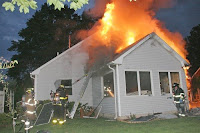
What happens if the house burns down before closing? Obviously, this leaves both the seller and the buyer in a quandary in terms of completion.
So, assuming that there has been some damage, what does the contract say? The standard form agreement of purchase and sale in common use in Ontario contains the following provision:
“14. INSURANCE: All buildings on the property and all other things being purchased shall be and remain until completion at the risk of Seller. Pending completion, Seller shall hold all insurance policies, if any, and the proceeds thereof in trust for the parties as their interests may appear and in the event of substantial damage, Buyer may either terminate this Agreement and have all monies paid returned without interest or deduction or else take the proceeds of any insurance and complete the purchase. No insurance shall be transferred on completion. If Seller is taking back a Charge/Mortgage, or Buyer is assuming a Charge/Mortgage, Buyer shall supply Seller with reasonable evidence of adequate insurance to protect Seller’s or other mortgagee’s interest on completion.”
You will notice that here is a difference in the treatment of the situation depending upon whether there is ordinary damage, or substantial damage.
Ordinary damage (which is any damage less than substantial (damage) does not give rise to an election. The insurance pays, or the owner pays, but the property is to be restored to the condition prior to the damage. The buyer must still complete the purchase.
Substantial damage permits the buyer the opportunity to elect to:
1) complete the transaction, or
2) terminate the transaction.
If the buyer elects to complete the transaction, then he is entitled to the proceeds of the insurance pursuant to the agreement of purchase and sale. But, the real question is whether the proceeds of insurance will be sufficient to repair the premises. The proceeds might be insufficient in circumstances where:
1) there is a co-insurance clause,
2) there is a specified monetary limit on the policy,
3) there is damage caused by an uninsured peril,
4) there is no replacement cost coverage,
5) one of the mortgagees claims the insurance proceeds, or
6) there is no insurance.
So, if that were the case, then the owner would have to volunteer to complete the sale by paying up the additional funds necessary to restore the premises. However, kindly note that there is no obligation upon the seller to do so.
Should the buyer elect to terminate the transaction, then he is entitled to the return of all monies paid under the transaction (usually just the deposits) without interest or deduction.
The agreement also contains a “time is of the essence” clause. There is no automatic extension in the event of fire damage. This extension must be agreed upon by the parties.
You will appreciate that there is a risk to the buyer if the seller fails to secure sufficient insurance coverage. It would not be unwise for a buyer to obtain his own policy early. Sometimes this will only be a few additional weeks. Coverage would only be required on the building and liability coverage could be omitted until closing. Every so often, such a policy will be of benefit to the insured.
Brian Madigan LL.B., Broker
